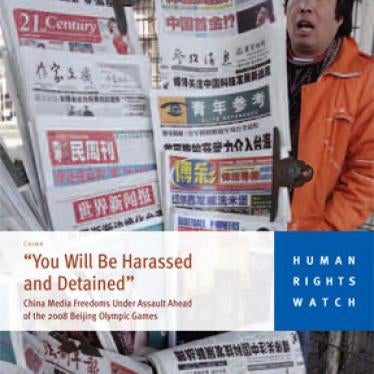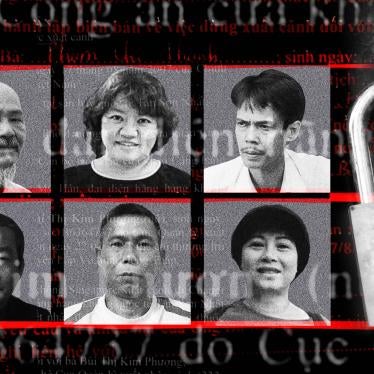(New York) - New Chinese government restrictions on news assistants of foreign correspondents and the creation of a Chinese journalist "blacklist" are major setbacks for media freedom in China, Human Rights Watch said today.
On February 13, 2009, the government issued a code of conduct for the Chinese news assistants of foreign correspondents that threatens dismissal and loss of accreditation for engaging in "independent reporting." The same day, the government announced it would create a "blacklist" of Chinese journalists deemed to have engaged in "illegal reporting."
"After taking some steps forward on media freedom in 2008, the Chinese government is now stepping backwards," said Sophie Richardson, Asia advocacy director at Human Rights Watch. "Granting greater freedom to foreign correspondents and then increasing the constraints on their crucial Chinese assistants can't be considered progress."
Human Rights Watch said that the Chinese government's actions cast fresh doubt on its claims that the 2008 Beijing Olympic Games resulted in greater development of human rights in China, particularly media freedom. At the United Nations Universal Periodic Review of China's human rights record in Geneva in February 2009, several countries raised concerns about abuses of Chinese and foreign journalists in China; government officials denied the existence of such abuses and noted that China's constitution "explicitly provides that citizens enjoy freedom of speech and of the press."
Chinese law forbids its citizens to work as journalists for foreign media in China. However, foreign correspondents in China, particularly those at China-based international news wire services, rely on local news assistants for their language skills and their ability to gather information quickly and efficiently. Representatives of wire services told Human Rights Watch that strict interpretation and enforcement of the code of conduct could harm their newsgathering operations in China.
On February 13, 2009, the Beijing Personnel Service Corporation for Diplomatic Missions, the government body that oversees the employment of news assistants, issued a new "Code of Conduct" for the dozens of local news assistants who work for foreign correspondents. Government officials said that the new code is a part of an effort to boost the professionalization and standardization of the employment of news assistants by foreign media.
The Code of Conduct states that news assistants face possible dismissal, loss of contracts, and revocation of accreditation if they undertake any "independent reporting" for their employers. Foreign correspondents told Human Rights Watch that the Chinese government has not provided any clarification on its criteria for "independent reporting," including functions often performed by news assistants. Additionally, the Code of Conduct requires news assistants to "limit themselves to assisting with reporting" and to "propagate positive information and ideas ... [about] China's history, culture and reforms."
The independent Foreign Correspondents Club of China (FCCC) announced on March 4 that the Code of Conduct had already begun to impair the ability of news assistants to engage with Chinese government agencies. The FCCC attributed the Code of Conduct's prohibition on news assistants' "independent reporting" to a decision by the organizers of this year's annual meeting of the National People's Congress, China's parliament, to refuse interview requests from news assistants. In recent years, prior to the introduction of the code, the organizers routinely accepted such requests (http://www.fccchina.org/what/statement060309.html ).
Chinese news assistants of foreign correspondents have good reason to fear official reprisals for the work they do. Zhao Yan, a researcher for the New York Times in Beijing, served a three-year prison sentence ending in September 2007 after being convicted of fraud in a case that was marred by multiple violations of due process and concerns that his conviction was politically motivated. Human Rights Watch has documented other instances of Chinese news assistants who have become the focus of Public Security Bureau scrutiny in apparent response to their coverage of issues ranging from high-profile dissidents to developments in China's economy (https://www.hrw.org/en/reports/2007/08/06/you-will-be-harassed-and-detained-0 ).
In October 2008, the Chinese government agreed to make permanent Olympics-related reporting freedoms for foreign correspondents. For the first time, foreign correspondents were permitted to interview any consenting interviewee without official permission, suggesting that the Chinese government was moving toward greater openness. Yet the new Code of Conduct appears to represent a reversal by penalizing Chinese assistants for performing their professional duties.
"Rather than threatening news assistants with punishment for merely doing their jobs, the Chinese government should abolish the discriminatory prohibition on Chinese citizens working as full-fledged journalists for foreign media organizations," Richardson said. "Otherwise, this Code of Conduct looks chiefly like a tool to control what information Chinese sources can - and can't - give to the foreign media."
Human Rights Watch also expressed concern with the announcement, issued the same day as the new Code of Conduct, from Li Dongdong, deputy director of China's General Administration of Press and Publication, that the government would compile a "blacklist" (Chinese: 黑名单) of Chinese journalists deemed to have engaged in "illegal reporting." Li said that journalists placed on the blacklist would be subject to penalties including a revocation of their accreditation and restrictions on their employment in the media industry.
False news reports and individuals who impersonate journalists are a legitimate, widespread problem in China. Relatively low-paid Chinese journalists are often bribed to cover particular stories, a practice that now prompts non-credentialed individuals to falsely claim to be journalists in order to receive those same financial benefits. Inadequate training in journalistic ethics and a national media that has traditionally served as a tool of the Chinese Communist Party rather than a purveyor of objective news and analysis have fostered an institutional culture for the production of false news reports.
Li did not specify the government's definition of "illegal reporting" or articulate a process by which such allegations could be appealed. As a result, Chinese journalists, who are already subject to an arsenal of vaguely worded and arbitrarily invoked laws such as those against "spreading rumors," are now at even greater risk of official reprisals if they carry out independent reporting on subjects the government deems sensitive.
Human Rights Watch is also concerned about the Chinese government's announcement on February 6, 2009, that Hong Kong and Macau reporters must apply to central government liaison offices for a temporary press card prior to every reporting trip they make to mainland China. Under Olympics-related temporary regulations, journalists from Hong Kong and Macau enjoyed the same freedoms as other foreign journalists; the recent announcement constitutes a return to the pre-Olympics constraints on reporters from these areas even though they are citizens of the People's Republic of China. The Hong Kong Journalists Association has expressed concern about the impact of the new reporting permit system on media freedom and on Hong Kong and Macau media's ability to respond quickly to breaking news stories on the mainland (http://www.hkja.org.hk/portal/Site.aspx?id=A1-765&lang=en-US ).
"The government's new rules to restrict who can report - and how - are clearly at odds with the media freedoms trumpeted by government officials and guaranteed in China's constitution," Richardson said. "These restrictions should be immediately reversed."







